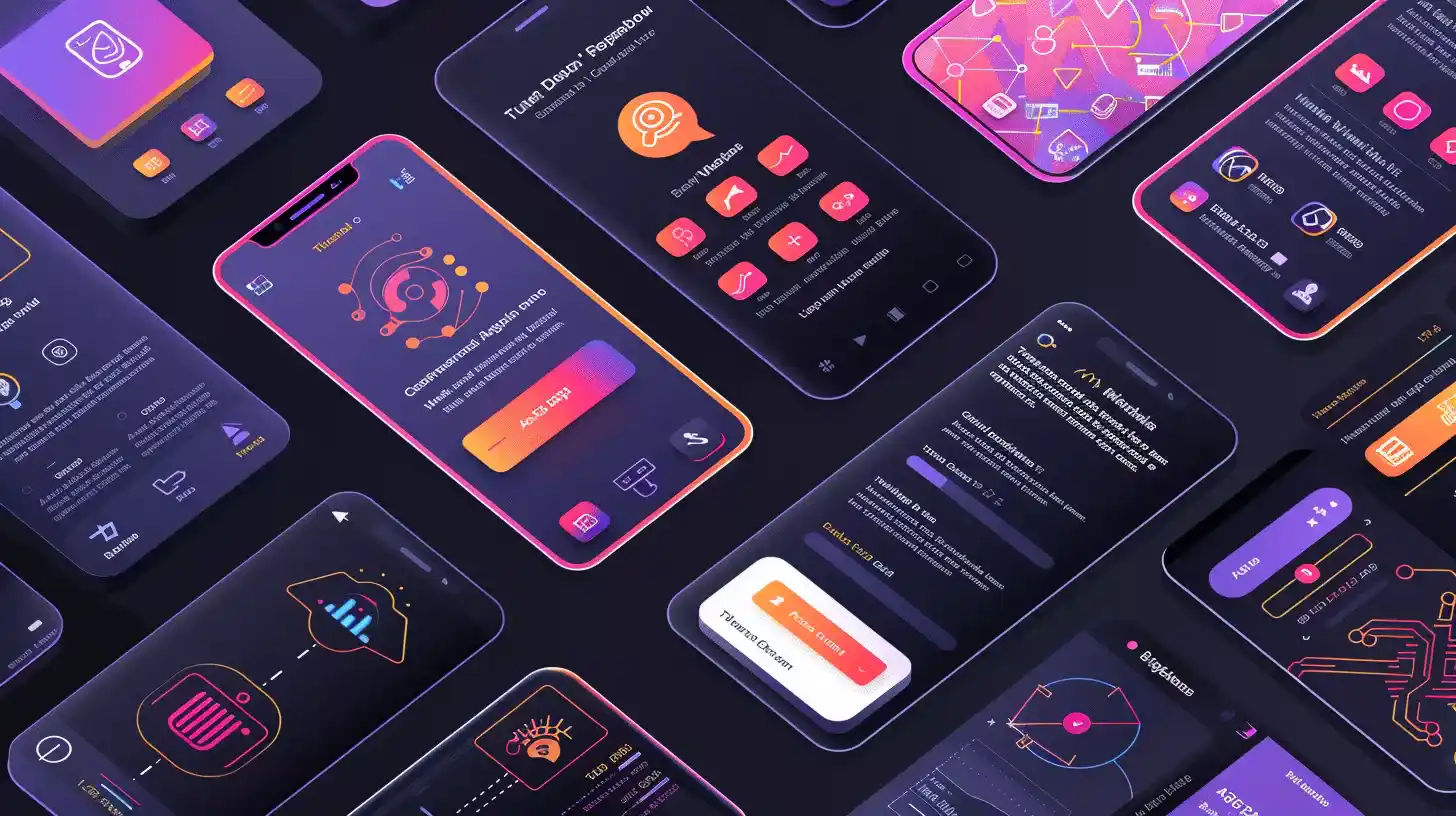Table of Contents
Introduction
The mobile app landscape is constantly evolving. Users crave ever-more engaging and personalized experiences. This is where AI mobile app development steps in as a game-changer. By integrating AI mobile app development into your mobile app, you can unlock a treasure trove of benefits, from smarter recommendations to intuitive voice assistants.
In this comprehensive guide, we’ll delve into everything you need to know about AI mobile app development. We’ll break down complex concepts into easy-to-understand steps, empowering you to transform your app into an AI-powered masterpiece.
Understanding AI Integration
Before diving headfirst, let’s gain a clear understanding of AI mobile app development. Simply put, AI integration involves incorporating intelligent functionalities powered by machine learning or deep learning algorithms into your mobile app. These algorithms can analyze vast amounts of data, identify patterns, and make predictions, ultimately enhancing your app’s capabilities.
Here are some of the common types of AI used in mobile apps:
- Machine Learning: Think of this as your app learning on the job. It doesn’t need explicit programming to improve. For example, a recommendation engine that suggests movies based on your past viewing history is powered by machine learning. The algorithm analyzes your watch history, identifies patterns in the types of movies you enjoy, and uses that knowledge to suggest similar movies you might like. Pretty cool, right?
- Deep Learning: This is the more complex cousin of machine learning. Artificial neural networks are the basis for deep learning algorithms, which take inspiration from the human brain’s structure and function. These networks allow the app to perform even more advanced tasks, such as image recognition or natural language processing. Imagine an app that can identify different types of flowers based on a picture you take with your phone’s camera. That’s the power of deep learning in action!
By integrating these types of AI algorithms into your mobile app, you unlock a treasure trove of possibilities. Your app can become more intelligent, personalized, and ultimately, more useful for your users.
Choosing the Right AI Technology
The world of AI is brimming with various technologies. Selecting the right one for your AI mobile app development is crucial for success. Here are the steps to make a well-informed choice:
- Identify Your Goals: What problem are you trying to solve with AI? Do you want to personalize user experiences, automate tasks, or improve data analysis? Clearly define your objectives to narrow down your AI technology options.
- Consider Your Resources: Developing and integrating complex AI models can be resource-intensive. Evaluate your budget, development expertise, and data availability to choose a technology that aligns with your capabilities.
Here are some popular AI development tools and platforms to consider:
- Open-source frameworks: TensorFlow, PyTorch, and Keras offer powerful libraries for building and deploying AI models.
- Cloud-based AI services: Major cloud providers like Amazon Web Services (AWS) and Google Cloud Platform (GCP) offer pre-trained AI models and tools that can simplify integration.
Steps to Integrate AI in Mobile Apps

Now that you’re armed with the knowledge, let’s get down to the nitty-gritty of AI mobile app development. Here’s a step-by-step guide to the AI life cycle stages of developing mobile apps:
- Data Collection and Preparation: AI thrives on data. Gather relevant data sets that align with your chosen AI technology and application. Ensure your data is clean, well-organized, and labeled appropriately for optimal training of your AI models.
- Model Selection and Training: Choose a pre-trained model or develop your own from scratch. Depending on your chosen technology, you might need to train your model on your prepared data set. This training process allows the model to learn and improve its ability to perform specific tasks.
- Mobile App Development: Integrate the trained AI model or chosen AI service into your mobile app’s architecture. This may involve utilizing APIs (Application Programming Interfaces) or SDKs (Software Development Kits) provided by your selected AI platform.
- Testing and Deployment: Rigorously test your app to ensure seamless integration and functionality of the AI component. Once satisfied, deploy your AI-powered app to the appropriate app store (e.g., Google Play Store, Apple App Store).
Best Practices for AI Integration
Integrating AI successfully requires following certain best practices:
- Focus on User Experience: Remember, AI is a tool to enhance the user experience. Don’t overwhelm users with complex AI features; ensure they are intuitive and add value.
- Prioritize Explainability: In some cases, it’s beneficial to explain how the AI component arrives at its decisions. This transparency builds trust with users and allows them to understand the value of AI in your app.
- Maintain Data Privacy: As your app collects and utilizes data for AI, ensure you adhere to data privacy regulations and user consent practices.
Case Studies
To truly understand the impact of AI in mobile apps, let’s explore some real-world examples:

- Netflix: The streaming giant leverages AI to power its recommendation engine. By analyzing user viewing history, ratings, and other data points, Netflix suggests personalized content for each user, keeping them engaged and subscribed. This not only enhances the user experience but also translates to valuable business outcomes for Netflix.
- Amazon: AI plays a central role in Amazon’s mobile app, powering features like product recommendations, voice search with Alexa and efficient logistics management. Imagine searching for a vague term like “comfy blanket” and receiving personalized suggestions based on your past purchases and browsing behavior. This is the power of AI in action, making online shopping a breeze. Furthermore, AI streamlines Amazon’s logistics network, optimizing delivery routes and ensuring faster product fulfillment.
- Snapchat: This social media platform utilizes AI for features like fun filters and lenses that enhance user-generated content. By leveraging facial recognition and object detection, AI allows users to add playful effects to their snaps, fostering a more engaging and interactive experience.
These are just a few examples, but they showcase the transformative potential of AI mobile app development across various industries. From e-commerce and entertainment to social media and productivity tools, AI is revolutionizing the way users interact with mobile apps.
Advanced AI Integration for Mobile Apps
As AI technology continues to evolve, so do the possibilities for AI mobile app development. Here’s a glimpse into some advanced applications:
- Computer Vision: AI can analyze images and videos within your app. Imagine a fitness app that utilizes computer vision to track your exercise form and provide real-time feedback. This level of personalized coaching can significantly enhance user results.
- Natural Language Processing (NLP): NLP allows your app to understand and respond to natural language. A travel app that leverages NLP could allow users to search for destinations or attractions using conversational language, making trip planning more intuitive.
- Augmented Reality (AR) and Virtual Reality (VR): AI can be integrated with AR and VR experiences to create immersive and interactive mobile applications. For example, an AR-powered furniture shopping app could allow users to virtually place furniture models in their homes to visualize scale and style.
There are only a couple of instances provided, but the potential is limitless. As AI development progresses, we can expect even more innovative and groundbreaking applications to emerge in the mobile app landscape.
Conclusion
By integrating AI into your mobile app, you’re not just keeping up with the times, you’re leaping into the future. AI mobile app development empowers you to create a more intelligent, personalized, and engaging user experience. Whether you’re a seasoned developer or just starting, the resources and tools available make AI integration more accessible than ever.
So, take the first step today and embark on your journey to create an AI-powered mobile app that stands out from the crowd. Remember, AI is not magic; it’s a powerful tool waiting to be harnessed. Unleash its potential and witness your mobile app soar to new heights! The future of mobile apps is intelligent, and AI mobile app development is the key to unlocking its potential.